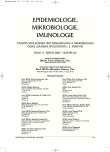-
Medical journals
- Career
ABC Transporter Proteins in Multidrug Resistance of Microorganisms
Authors: K. Balková; Y. Gbelská
Authors‘ workplace: Bratislava ; Univerzita Komenského v Bratislave, Prírodovedecká fakulta, Katedra mikrobiológie a virológie
Published in: Epidemiol. Mikrobiol. Imunol. 56, 2007, č. 3, s. 129-139
Overview
The ABC (ATP binding cassette) transporter family includes membrane proteins that can transport a wide variety of substrates across biological membranes. These proteins play an essential role in the protection of cells from toxic compounds/metabolites. Their overexpression which leads to the development of multidrug resistance (MDR) in pathogens and enables cancer cells to survive chemotherapy is of major concern for human health. Mutations in ABC transporters are implicated in a number of Mendelian disorders such as cystic fibrosis, adrenoleukodystrophy and cholesterol and bile transport defects. In microbial cells, several homologues of human ABC transporters were identified. Their further molecular biological study can contribute to better understanding and treatment of MDR or diseases caused by dysfunction of ABC transporter proteins. A review is presented of the state of the art in ABC transporter proteins in both prokaryotic and eucaryotic cells. The role of microbial ABC transporters in the development of drug resistance is analyzed.
Key words:
ABC transporter proteins – multidrug resistance – procaryotes – eucaryotes.
Labels
Hygiene and epidemiology Medical virology Clinical microbiology
Article was published inEpidemiology, Microbiology, Immunology

2007 Issue 3-
All articles in this issue
- Clinically Important β-Lactamases of Gram-Negative Bacteria: Extended-Spectrum β-Lactamases (ESBL)
- Prion Diseases
- Immunogenicity of Vaccines Against Viral Hepatitis A and B in the Population above 40 Years of Age – Impact of Risk Factors
- ABC Transporter Proteins in Multidrug Resistance of Microorganisms
- Results of Surveillance of Human Leptospirosis
- Epidemiology, Microbiology, Immunology
- Journal archive
- Current issue
- Online only
- About the journal
Most read in this issue- Clinically Important β-Lactamases of Gram-Negative Bacteria: Extended-Spectrum β-Lactamases (ESBL)
- Prion Diseases
- Immunogenicity of Vaccines Against Viral Hepatitis A and B in the Population above 40 Years of Age – Impact of Risk Factors
- ABC Transporter Proteins in Multidrug Resistance of Microorganisms
Login#ADS_BOTTOM_SCRIPTS#Forgotten passwordEnter the email address that you registered with. We will send you instructions on how to set a new password.
- Career

